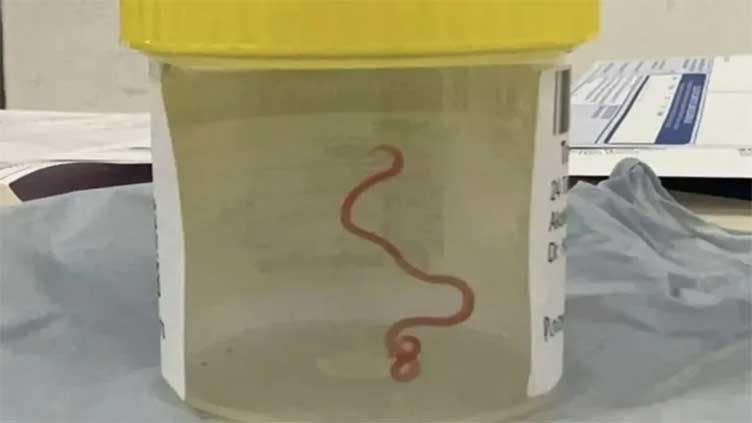Doctors pull giant wriggling snake parasite out of woman's brain

WeirdNews
She reported suffering from abdominal pain and diarrhoea for three weeks
(Web Desk) - Doctors were stumped by the case of woman who complained of a mysterious set of symptoms - they never expected to pull a wriggling parasitic worm out of her brain.
The 64-year-old woman from New South Wales, Australia, was admitted to her local hospital in January 2021.
She reported suffering from abdominal pain and diarrhoea for three weeks, followed by a dry cough and night sweats, according to a case report published by the Centers for Disease Control and Prevention (CDC).
Upon examination, doctors saw that she had spots of damage in her lungs, liver and spleen.
They tested her for infections, bacterial strains, fungi, human parasites and even an autoimmune disease, to no avail - all the tests came back negative.
The woman visited the hospital again three weeks later, this time complaining of a fever and cough.
Doctors got the first clue about the cause behind her mysterious condition after ordering a CT scan, which captures detailed images of the inside of the body.
It showed that some damaged spots in her lungs appeared to be moving.
The second clue came in 2022, when the patient started to become forgetful and depressed over a three-month period.
An MRI scan of the 64-year-old's brain showed a ghostly glow in her right frontal lobe.
According to infectious disease physician at the Australian National University and the Canberra Hospital, Sanjaya Senanayake, the glow in the scans could be showing cancer or a pocket of pus.
Neurosurgeon Dr Hari Priya Bandi decided to perform a biopsy of the woman's brain, which usually involves the removal of a tiny bit of tissue.
She spotted a strange, spring-like structure during the procedure and plucked at it with her forceps - the last thing she expected to grasp was wriggling, pinkish-red worm.
Having overcome their shock, the team set about identifying the worm so they could treat the woman properly.
They were surprised to discover that the worm, called Ophidascaris robertsi, doesn't usually infect humans - its usual hosts are snakes and small mammals, such as carpet pythons and rats or possums.
In fact, this is the first time this kind of parasite has ever been found in a human, in a world first.
"The patient in this case resided near a lake area inhabited by carpet pythons," the team wrote in their case study published by the CDC.
"Despite no direct snake contact, she often collected native vegetation, warrigal greens, from around the lake to use in cooking.
"We hypothesized that she inadvertently consumed O. robertsi eggs either directly from the vegetation or indirectly by contamination of her hands or kitchen equipment."
The eggs would have hatched in her body, with the larvae wondering through her organs and causing damage in their path.
After removing the worm for the patient's brain doctors treated her with parasite-killing drugs, which improved her symptoms.
Her team of doctors said this mysterious case shows the heightened risk of diseases and infections passing from animals to humans, especially as people and animals start to live more closely together and interact more.
They said "additional human cases [of O. robertsi ] may emerge globally".
Dr Senanayake told The Guardian: “There have been about 30 new infections in the world in the last 30 years.
“Of the emerging infections globally, about 75 per cent are zoonotic, meaning there has been transmission from the animal world to the human world. This includes coronaviruses."


